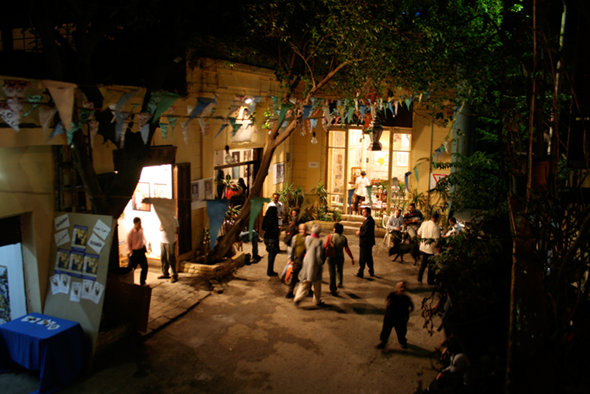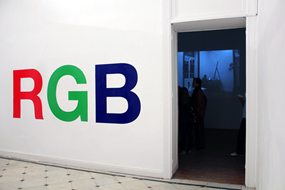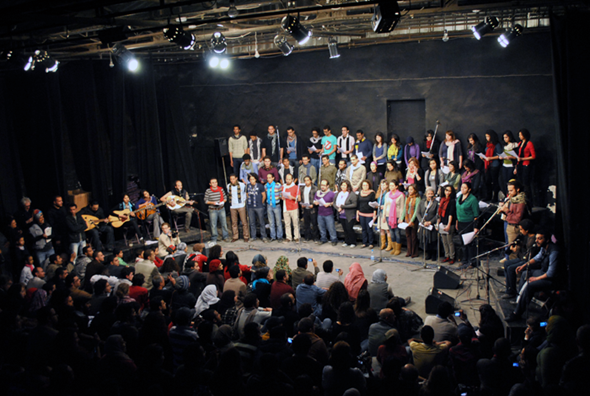
Townhouse Gallery, Cairo
Since the Arab Spring, in Egypt, a classic programme of exhibitions has become irrelevant. Townhouse is reacting to this by making their space available to communities with other needs and initiating projects that respond to the desire for reflection, discussion, and social responsibility. SARAH RIFKY talks with WILLIAM WELLS about the history of the Cairo-based gallery, which has recently become a foundation.
SARAH RIFKY: Since Townhouse’s founding in 1998, it has played a significant role as a platform for artists in Egypt and the region, particularly up-and-coming artists. It is pertinent to mention that it has acted as an incubator for various initiatives, collectives and organizations over the last decade. It is definitely a major contributor to the ecology of Egypt’s art scape. Townhouse has grown quite organically over the years and is both context-responsive and site-specific. When you started the gallery, did you think it was going to grow into what it is today?
WILLIAM WELLS: When we first started the gallery, people were skeptical about whether a public would come all the way into the back alleys of the mechanics, Nabrawy and Champollion streets in the Antikhana district, to see art. But, somehow, eventually people started coming. At first, I would go to all the galleries in Downtown and give out maps marking all spaces, like Karim Francis, Mashrabiya, and Cairo- Berlin, which closed with Renata’s passing, and I would offer to take people on tours to the art spaces around Townhouse. Eventually, we also tried to schedule events and exhibition openings on the same nights as other art spaces in the city.
RIFKY: The location of the gallery is a mixed blessing of sorts, with the spaces being in Downtown – so near to all the political insurgence. How does this affect your programming?
WELLS: Since 25 January 2011, a traditional arts programming model has become functionally irrelevant in Egypt. In this context of conflict and change, diverse publics have asked to use Townhouse’s spaces in ways that extend far beyond the scope of visual arts exhibitions. Consequently, over the past year, we have focused on initiating and supporting projects that respond to these calls for a space for critique, reflection, discussion, and engagement with contemporary social issues.
RIFKY: Would you describe your approach, generally, as context- responsive? It has responded both to the local community as well as to the general art community.
WELLS: When I started the space, it arose out of conversations with artists and in direct response to what they seemed to need at the time, a space that would allow them to show their work outside strictly commercial considerations. We were also working with the general community as well as underprivileged groups.
RIFKY: What kind of workshops have you been hosting?
WELLS: There’re so many! There’s the Friday Workshops and SAWA. The workshops were first created with specific communities in mind – working children (victims of child labour), street kids, refugee communities in the city and so on. We aren’t trained in social work. So, with time, we also realized that we were propagating certain things, and we started becoming more aware of how important it is to make sure the communities are integrated. The workshops are open to everyone, and it’s an extremely lively and dynamic process. Many of the people who came to the workshops as children are now instructors. Almost everyone in the lane has been a part of one workshop or another. You know how it is; it’s Cairo. It’s important to be open, and being accepted in the neighborhood is as important for us as it is for us to make sure everyone feels welcome. It’s also a question of livelihood. In the end you become part of this place. We all live here.
RIFKY: You’ve been in Cairo, what … over twenty years now? I’m often asked if you’re Canadian, and I respond that you’re not really – perhaps »white Egyptian« …What brought you to Egypt?
WELLS: I had always been interested in Egypt, and I was a student of Ancient History and Fine Art in London before I moved on to teaching. I was working with the British Arts Council, and I actually moved to Egypt in the 80s. It’s such a long time ago …
RIFKY: What has changed for you the most since the founding of Townhouse?
WELLS: Many things. The gallery went through many stages – from being a small experimental gallery all the way to what it is today, a space that doesn’t only do exhibitions, but also supports educational programs at all levels – not just for art, but also for design, from vocational training all the way to curating and art history. We have the Raawabet, where there’s a lot of music and theater going on. The Outreach programs are quite extensive and have grown to become one of our most important activities. And we have many other things …
RIFKY: But on a regional versus an international level, Townhouse has somehow been received differently.
WELLS: Well, in the region, we are of the same generation of spaces as Ashkal Alwan in Beirut and Platform Garanti (now SALT) in Istanbul. Over the years, we’ve also come to consult for museums and galleries worldwide and sometimes stand in at international fairs, even though we are no longer commercial. We are part of many great local, regional and international networks.
RIFKY: In my experience, Townhouse truly is an institution that does conform to the traditional understanding of what an institution is or does. It’s quite flexible and ever-changing. But what do you predict is going to become of its activities now – with elections coming up and this general time of change here in Egypt?
WELLS: It is difficult, if not impossible, to predict how the social and political landscape in the region will change over the coming months and years. It is certain, though, that Townhouse and other art spaces will need to continue negotiating the relationship between our curatorial models and the evolving needs and desires of local artists and the wider community as well. We are committed, of course, to supporting local and regional art. It is a very erratic but also exciting time for us!
WILLIAM WELLS, born in Canada, founded Townhouse Gallery in 1998, and has been director there ever since.
SARAH RIFKY is a writer and curator. Rifky is director of CIRCA (Cairo International Resources Center for Art), and co-directs Beirut, a space for art in Cairo.



